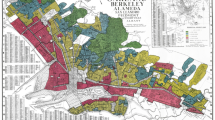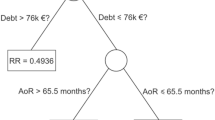Abstract
Deep learning recently attracts considerable attention thanks to its powerful computational capacities in image processing and natural language processing. More and more real estate brokers provide online “Deep” expert systems to help clients with their inquiry of targeted properties before deciding on the transaction of properties. The real estate appraisal is one of the most significant concerns for the clients. In the appraisal process, the estimation of house price depends not only on its attributes but also their neighbors. The influence from neighbors is known as peer-dependence, which is not directly measurable. Thus, real estate appraisal can be improved if the valuation includes the peer-dependence measurement. In this paper, we propose a peer-dependence valuation model (PDVM), which is capable of converting the peer-dependence-based valuation problem into a sequence prediction problem. In the proposed model, we first develop a method, K-nearest similar house sampling (KNSHS), to generate sequences from the to-be-value house and nearby houses. Secondly, the bidirectional long short-term memory (B-LSTM) layers extract the features of sequences. Finally, the fully connected (FC) layer estimates the house price based on the features. The experimental results indicate that our model outperforms the other state-of-the-art machine learning models being used for real estate appraisal.




Similar content being viewed by others
References
E.A. Antipov, E.B. Pokryshevskaya, Mass appraisal of residential apartments: an application of random forest for valuation and a CART-based approach for model diagnostics. Expert Syst. Appl. 39(2), 1772–1778 (2012)
C.G. Atkeson, A.W. Moore, S. Schaal, Locally weighted learning. Artif. Intell. Rev. 11(1/5), 11–73 (1997)
A. Bellotti, Reliable region predictions for automated valuation models. Ann. Math. Artif. Intell. 81(1), 71–84 (2017)
J. Bin, S. Tang, Y. Liu, G. Wang, B. Gardiner, Z. Liu, E. Li, Regression model for appraisal of real estate using recurrent neural network and boosting tree. In: 2017 2nd IEEE International Conference on Computational Intelligence and Applications (ICCIA), Beijing, China, pp. 209–213 (2017)
H. Chen, Z. Zeng, H. Tang, Landslide deformation prediction based on recurrent neural network. Neural. Process. Lett. 41(2), 169–178 (2013)
K. Chen, Y. Zhou, F. Dai, in A LSTM-based method for stock returns prediction: a case study of China stock market. 2015 IEEE International Conference on Big Data (Big Data) (IEEE, Santa Clara, 2015), pp. 2823–2824
T. Chen, C. Guestrin, Xgboost: a scalable tree boosting system. In: Proceedings of the 22nd ACM SIGKDD International Conference on Knowledge Discovery and Data Mining - KDD’16, ACM Press (2016)
F. Chollet, et al., Keras. https://github.com/keras-team/keras (2015)
S. Chopra, T. Thampy, J. Leahy, A. Caplin, Y. LeCun, in Discovering the hidden structure of house prices with a non-parametric latent manifold model. KDD ’07 Proceedings of the 13th ACM SIGKDD International Conference on Knowledge Discovery and Data Mining - KDD’07 (ACM Press, San Jose, 2007)
D.D. Cock, House prices: advanced regression techniques. https://www.kaggle.com/c/house-prices-advanced-regression-techniques. Accessed June 01 2017 (2017)
Estated, Property reports. https://estated.com/reports, Accessed 10 September 2017 (2017)
G.Z. Fan, S.E. Ong, H.C. Koh, Determinants of house price: a decision tree approach. Urban Stud. 43 (12), 2301–2315 (2006)
J.H. Friedman, Greedy function approximation: a gradient boosting machine. Ann. Stat. 29(5), 1189–1232 (2001)
Y. Fu, H. Xiong, Y. Ge, Z. Yao, Y. Zheng, Z.H. Zhou, in Exploiting geographic dependencies for real estate appraisal: a mutual perspective of ranking and clustering. KDD ’14 Proceedings of the 20th ACM SIGKDD International Conference on Knowledge Discovery and Data Mining (ACM, New York, 2014), pp. 1047–1056
A. Gensler, J. Henze, B. Sick, N. Raabe, in Deep learning for solar power forecasting - an approach using autoencoder and LSTM neural networks. 2016 IEEE International Conference on Systems, Man, and Cybernetics (SMC) (IEEE, Budapest, 2016)
I. Goodfellow, Y. Bengio, A. Courville. Deep learning (MIT Press, Cambridge, 2016)
M. Graczyk, T. Lasota, B. Trawiṅski, in Comparative analysis of premises valuation models using KEEL, RapidMiner, and WEKA. Computational Collective Intelligence. Semantic Web, Social Networks and Multiagent Systems (Springer, Berlin, 2009), pp. 800–812
M. Graczyk, T. Lasota, B Trawiński, K Trawiński, Comparison of bagging, boosting and stacking ensembles applied to real estate appraisal. In: Proceedings of the Second International Conference on Intelligent Information and Database Systems: Part II, Hue City, Vietnam, pp. 340–350 (2010)
A. Graves, Generating sequences with recurrent neural networks. arXiv:1308.0850v5 (2014)
A. Graves, A. Rahman Mohamed, G. Hinton, Speech recognition with deep recurrent neural networks. arXiv:1303.5778v1 (2013)
K. He, J. Sun, Convolutional neural networks at constrained time cost. In: 2015 IEEE Conference on Computer Vision and Pattern Recognition (CVPR), pp. 5353–5360 (2015)
K. He, X. Zhang, S. Ren, J. Sun, Deep residual learning for image recognition. arXiv:1512.03385 (2015)
T.J. Kauko. Modelling the Locational Determinants of House Prices: Neural Network and Value Tree Approaches (PhD thesis Universiteit Utrecht, Utrecht, 2002)
V. Kontrimas, A. Verikas, The mass appraisal of the real estate by computational intelligence. Appl. Soft Comput. 11(1), 443–448 (2011)
M.B. Kursa, A. Jankowski, W.R. Rudnicki, Boruta – a system for feature selection. Fund. Inform. 101 (4), 271–285 (2010)
T. Lasota, P. Sachnowski, B. Trawiṅski, in Comparative analysis of regression tree models for premises valuation using statistica data miner. Computational Collective Intelligence. Semantic Web, Social Networks and Multiagent Systems (Springer, Berlin, 2009), pp. 776–787
Y. LeCun, Y. Bengio, G. Hinton, Deep learning. Nature. 521(7553), 436–444 (2015)
S. McGreal, A. Adair, D. McBurney, D. Patterson, Neural networks: the prediction of residential values. J. Prop. Valuat. Invest. 16(1), 57–70 (1998)
V. Moosavi, Urban data streams and machine learning: a case of swiss real estate market. arXiv:1704.04979 (2017)
N. Nguyen, A. Cripps, Predicting housing value: a comparison of multiple regression analysis and artificial neural networks. The Journal of Real Estate Research. 22(3), 313–336 (2001)
B. Park, J.K. Bae, Using machine learning algorithms for housing price prediction: the case of Fairfax County, Virginia housing data. Expert Syst. Appl. 42(6), 2928–2934 (2015)
RF/MAX, Home estimates. https://www.remax.com/, Accessed November 20 2017 (2017)
D. Sangani, K. Erickson, M.A. Hasan, Predicting Zillow estimation error using linear regression and gradient boosting. In: 2017 IEEE 14th International Conference on Mobile Ad Hoc and Sensor Systems (MASS), pp. 530–534 (2017)
H. Selim, Determinants of house prices in turkey: hedonic regression versus artificial neural network. Expert Syst. Appl. 36(2), 2843–2852 (2009)
T. Tieleman, G. Hinton, Lecture 6.5 - RMSProp. COURSERA: neural networks for machine learning (2012)
B Trawiński, Z. Telec, J. Krasnoborski, M. Piwowarczyk, M. Talaga, T. Lasota, E. Sawiłow, Comparison of expert algorithms with machine learning models for real estate appraisal. In: 2017 IEEE International Conference on Innovations in Intelligent Systems and Applications (INISTA), Gdynia, Poland, pp. 51–54 (2017)
V.N. Vapnik, Statistical Learning Theory. Wiley-Interscience (1998)
N. Vo. A New Conceptual Automated Property Valuation Model for Residential Housing Market (PhD thesis Victoria University, Victoria, 2014)
K. Vrijdag. Auction Price Prediction: an Instance-Transfer Learning Approach (PhD thesis Eindhoven University of Technology, Eindhoven, 2016)
I. Wilson, S. Paris, J. Ware, D. Jenkins, Residential property price time series forecasting with neural networks. Knowl.-Based Syst. 15(5), 335–341 (2002)
E. Worzala, M. Lenk, A. Silva, An exploration of neural networks and its application to real estate valuation. Journal of Real Estate Research. 10(2), 185–201 (1995)
Q. You, R. Pang, J. Luo, Image based appraisal of real estate properties. IEEE Trans. Multimed. 19 (12), 2751–2759 (2017)
K. Zhang, W.L. Chao, F. Sha, K. Grauman, Video summarization with long short-term memory. In: Computer Vision – ECCV 2016, IEEE, pp. 766–782 (2016)
Zillow, Home for sales. https://www.zillow.com/, Accessed 16 December 2017 (2017)
Zillow, Zillow prize: Zillow’s home value prediction. https://www.kaggle.com/c/zillow-prize-1, Accessed Dec 02 2018 (2017)
Acknowledgements
The authors express their sincere gratitude to Kaiqi Zhang (AECOM), Fang Shi (University of British Columbia, Kelowna, Canada), and Dr. Huan Liu (China University of Geosciences, Wuhan, China) for the helpful discussions when this work was being carried out.
Funding
The study was supported by Mitacs Accelerate Program (Application Reference Number: IT08399).
Author information
Authors and Affiliations
Corresponding author
Rights and permissions
About this article
Cite this article
Bin, J., Gardiner, B., Li, E. et al. Peer-Dependence Valuation Model for Real Estate Appraisal. Data-Enabled Discov. Appl. 3, 2 (2019). https://doi.org/10.1007/s41688-018-0027-0
Received:
Revised:
Accepted:
Published:
DOI: https://doi.org/10.1007/s41688-018-0027-0




